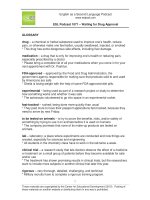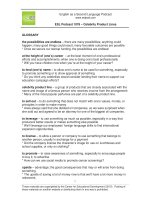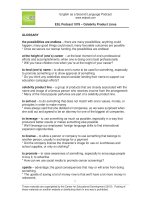ESL podcast 1078 – watching action movies
Bạn đang xem bản rút gọn của tài liệu. Xem và tải ngay bản đầy đủ của tài liệu tại đây (92.44 KB, 9 trang )
English as a Second Language Podcast
www.eslpod.com
ESL Podcast 1078 – Watching Action Movies
GLOSSARY
action movie – an exciting movie with a hero who fights against bad guys with
many physical fights, explosions, chases, and violence
* This action movie really doesn’t seem appropriate for children.
thriller – an exciting and suspenseful film that might involves a lot of surprise,
worry, and even fear, but not necessarily with violence
* The movie was a great thriller that captivated us and kept us wondering what
would happen next.
brainless – without requiring thinking or intelligence; not intellectual or thoughtprovoking
* Yolanda says she’s tired of her boring, brainless factory job.
fight scene – one part of a movie or television show where characters have
physical fights with each other
* Have you ever covered your children’s eyes during a fight scene?
on the edge of (one’s) seat – with a lot of excitement and anticipation, very
eager to find out what will happen next
* The play was so interesting that it kept all the audience members on the edge
of their seat.
car chase – when the driver of one car chases the driver of another car at very
high speeds, especially when a police officer is chasing a criminal
* Police officers are trained to react quickly when driving so that they can drive as
safely as possible during car chases.
hero – protagonist; the main character of a story or movie, who is good and
whom people admire and respect
* In the end, the hero saves the town and wins the heart of the girl.
life-threatening – endangering; putting one at risk of death; very dangerous
* His injuries are serious, but not life-threatening.
evil – very bad; associated with the devil
* Do you believe people are evil, or only their actions are evil?
1
These materials are copyrighted by the Center for Educational Development (2015). Posting of
these materials on another website or distributing them in any way is prohibited.
English as a Second Language Podcast
www.eslpod.com
ESL Podcast 1078 – Watching Action Movies
villain – antagonist; a very bad person who is the opposite of the hero; a person
who has bad motives and creates problems for others
* In Sleeping Beauty, the villain is a queen who wants to be the most beautiful
woman in the world.
in hot pursuit – immediately following someone; chasing someone very closely,
almost catching up with him or her
* The police thought they were in hot pursuit of the murderer, but then they lost
the trail.
run-of-the-mill – ordinary; standard; not interesting or exceptional
* This is a run-of-the-mill health and safety inspection, nothing to worry about.
visual effects – images in a movie or television show that have been changed,
especially with the use of computers
* The movie uses visual effects to show an attack on the city by aliens.
stunt – a dangerous and frightening action performed by someone with special
skills, especially while filming a movie
* Did the actor perform his own stunts, or was someone else doing them for him?
adrenaline rush – a sudden feeling of excitement and extra energy and
strength, produced by an increase in the adrenaline hormone, especially in
response to stress or danger
* Jumping out of an airplane produces an incredible adrenaline rush.
psychological thriller – a thriller that focuses on the emotions, thoughts, and
mind of the main character, creating suspense and anxiety
* Alma enjoys psychological thrillers that provide insight into the mind of a killer.
to straddle the line – to be on both sides of something; to have characteristics
of two categories, so that something cannot easily be classified as one or the
other
* Jean’s daughter’s behavior straddles the line between cute and annoying.
ultra – extremely; with a lot of something
* We’re going to an ultra-sophisticated restaurant, so please wear your nicest
clothes.
violent – using physical force to hurt or kill someone, or to damage something
* George and Lisa have loud, angry fights, but they’ve never been violent.
2
These materials are copyrighted by the Center for Educational Development (2015). Posting of
these materials on another website or distributing them in any way is prohibited.
English as a Second Language Podcast
www.eslpod.com
ESL Podcast 1078 – Watching Action Movies
COMPREHENSION QUESTIONS
1.
a)
b)
c)
What is a run-of-the-mill movie?
A low-budget film
A poor-quality film
A typical, standard film
2.
a)
b)
c)
Who do audience members typically to want to win or succeed?
A thriller
A hero
A villain
______________
WHAT ELSE DOES IT MEAN?
in hot pursuit
The phrase “in hot pursuit,” in this podcast, means immediately following
someone, or chasing someone very closely and almost catching up with him or
her: “The second-place winner was in hot pursuit of the lead runner throughout
the entire race.” The word “pursuit” describes actively trying to reach, get, or
have something: “She has submitted over one hundred applications in pursuit of
a higher-paying job.” Finally, “pursuits” and especially “leisure pursuits” are
formally used to refer to hobbies and other activities that one does in one’s free
time: “His leisure pursuits include golf, horseback riding, and wine tasting.”
to straddle the line
In this podcast, the phrase “to straddle the line” means to be on both sides of
something, or to have characteristics of two categories, so that something cannot
easily be classified as one or the other: “James’ research straddles biochemistry,
mathematics, and medical science.” Or, “As the daughter of two immigrants,
Meghdal often feels she is straddling two cultures.” The verb “to straddle” means
to sit or stand with one’s legs on either sides of something: “At first, it was
uncomfortable to straddle the large motorcycle.” Or, “Women used to ride horses
side-saddle, because people thought it was inappropriate, unhealthy, or
unnatural for them to straddle a horse like men did.” Finally, the verb “to straddle”
can mean to be on both sides of something: “Our state’s commerce straddles the
international border.”
3
These materials are copyrighted by the Center for Educational Development (2015). Posting of
these materials on another website or distributing them in any way is prohibited.
English as a Second Language Podcast
www.eslpod.com
ESL Podcast 1078 – Watching Action Movies
CULTURE NOTE
Swashbuckler Films
“Swashbuckler films” are a “genre” (type of story or art) of action films with strong
heroes who “engage in” (participate in) many fights, especially “sword fights” or
“fencing,” which are “disputes” (disagreements) fought with “swords” (long
weapons like very sharp, long knives with a fancy handle). The heroes are
almost always men who fight against “clear” (unquestioned) villains. The women
in the films are usually “helpless” (unable to help themselves) “damsels in
distress” (a woman who needs a man to rescue her).
Most swashbuckler films are “set” (created to show action at a specific time and
place) in Western Europe in the Renaissance. The actors wear “elaborate” (very
detailed) and “lavish” (expensive, luxurious, and elegant) “costumes” (clothing
worn by an actor to play a particular character).
In the past, a “swashbuckler” was a man with poor sword-fighting skills who
covered his inabilities by “bragging” (saying good things about oneself), but now
a “swashbuckler” is better described as a “loudmouthed” (very opinionated,
saying too much, too loudly) hero.
Swashbuckler films were very popular at the “advent” (beginning; first
appearance) of film. Many of the stories were based on romantic novels, and the
films “incorporated” (included and used) very dramatic music.
Popular swashbuckler films include The Mask of Zorro, The Three Musketeers,
The Count of Mote Cristo, and The Scarlet Pimpernel. More modern
swashbuckler films include Pirates of the Caribbean and The Princess Bride.
______________
Comprehension Questions Correct Answers: 1 – c; 2 – b
4
These materials are copyrighted by the Center for Educational Development (2015). Posting of
these materials on another website or distributing them in any way is prohibited.
English as a Second Language Podcast
www.eslpod.com
ESL Podcast 1078 – Watching Action Movies
COMPLETE TRANSCRIPT
Welcome to English as a Second Language Podcast number 1,078 – Watching
Action Movies.
This is English as a Second Language Podcast episode 1,078. I’m your host, Dr.
Jeff McQuillan, coming to you from the Center for Educational Development in
beautiful Los Angeles, California.
Visit our website at ESLPod.com. Download a learning guide for this episode.
You can do that by becoming a member of ESL Podcast. On this episode, we’re
going to listen to a dialogue between Jean and Claude regarding movies that
have a lot of excitement in them. Let’s get started.
[start of dialogue]
Claude: Oh no, this isn’t another action movie, is it?
Jean: Of course not. I know you like thrillers, and this is a thriller.
Claude: This definitely seems like a brainless action movie to me. That’s the
second fight scene, and we’re only 15 minutes into the film.
Jean: It’s a thriller that’s supposed to keep you on the edge of your seat. Of
course it’ll have some fight scenes.
Claude: And car chases? We’ve had three of those already, too.
Jean: Like any good thriller, it has a hero in a life-threatening situation and an evil
villain in hot pursuit.
Claude: That sounds like a run-of-the-mill action movie to me. This movie is full
of visual effects and stunts. It’s all about the adrenaline rush. It’s not what I would
call a psychological thriller.
Jean: Maybe it straddles the line between an action film and a thriller, but it’s
good, isn’t it?
Claude: I’ll let you know once this ultra-violent fight scene is over.
[end of dialogue]
5
These materials are copyrighted by the Center for Educational Development (2015). Posting of
these materials on another website or distributing them in any way is prohibited.
English as a Second Language Podcast
www.eslpod.com
ESL Podcast 1078 – Watching Action Movies
Claude begins the dialogue by saying, “Oh no, this isn’t another action movie, is
it?” An “action (action) movie” is a movie that has usually a lot of fighting, a lot of
car chases, often a lot of violence. Action movies have a hero – a good guy –
and then one or more bad guys that the good guy, of course, fights. Jean says,
“Of course not. I know you like thrillers, and this is a thriller.” A “thriller” (thriller) is
also an exciting movie, but instead of having a lot of fights or violence, it involves
a lot of surprise or even fear.
Now, sometimes there can be violence in a thriller as well, but a thriller would be
a movie during which you are waiting to see what will happen. You’re going to be
surprised at what happens. In an action movie, you’re often not surprised at what
happens. You kind of know what’s going to happen – the good guy is going to
win. But in a thriller, there’s more of what we would call “suspense” (suspense) –
when you don’t know what’s going to happen.
Claude says, “This definitely seems like a brainless action movie to me.”
“Brainless” means that it isn’t very smart. It isn’t very intelligent. Your “brain”
(brain), of course, is what’s in your head, or at least what’s in most people’s
heads. I’m not quite sure about my neighbor. “Brainless” (less) would be
someone who didn’t have a brain, or not a very big brain. The term “brainless” is
an insulting one to describe something you think is stupid or not very intelligent.
Claude says that this is “a brainless action movie” that Jean is watching.
He says, “That’s the second fight scene, and we’re only 15 minutes into the film.”
A “fight scene” (scene) is a part of a movie where, of course, people are fighting.
When we talk about “scenes” in a movie, we’re talking about different parts or
sections of the movie with the same characters or people in the same place.
Claude says, “This is the second fight scene, and we’re only 15 minutes into the
film,” meaning we’ve only been watching the movie for 15 minutes.
Jean says, “It’s a thriller that’s supposed to keep you on the edge of your seat.”
When we say something keeps you “on the edge (edge) of your seat,” we mean
that there’s a lot of excitement, a lot of suspense, a lot of anticipation. Everyone
is eager or very much interested in finding out what’s going to happen next. A
thriller keeps you on the edge of your seat. If you’re sitting on a chair on the edge
of your seat – “seat” is another word for chair – you are just about to get up or
you are leaning forward towards the front of the chair. If you’re relaxed, you
would be sitting back against the back of the chair.
Jean says, “Of course it’ll have some fight scenes,” meaning the movie will have
some fight scenes even though it is a thriller. Claude doesn’t seem to agree with
Jean. He says, “And car chases? We’ve had three of those already, too.” A “car
6
These materials are copyrighted by the Center for Educational Development (2015). Posting of
these materials on another website or distributing them in any way is prohibited.
English as a Second Language Podcast
www.eslpod.com
ESL Podcast 1078 – Watching Action Movies
chase” (chase) is when one car tries to catch another car, both of them usually
going very fast. Action movies typically have lots of car chases in them. Claude is
saying that this isn’t really a thriller because it has all of the elements, or parts, of
an action movie, such as car chases.
Jean disagrees. She says, “Like any good thriller, it has a hero in a lifethreatening situation and an evil villain in hot pursuit.” A “hero” (hero) is a good
guy – the person, man or woman, who is the main character of the movie and is
the one that is going to beat, or defeat, the bad guys. If you’re in a “lifethreatening situation,” you’re in a situation where you could die. And of course, in
movies that is often the case.
The hero always fights against a “villain” (villain). A villain is a bad guy in the
movie, the opposite of the hero. Jean calls him “the evil villain,” but villains are
always evil. “Evil” just means bad. Jean says that this movie has “a hero in a lifethreatening situation and an evil villain in hot pursuit.” The word “pursuit” (pursuit)
comes from the verb “to pursue” (pursue). “To pursue” means to run after or
chase after someone – to try to catch someone who is escaping from you or who
is trying to get away from you.
“To pursue” can also mean simply to go on a certain path to try to obtain some
goal. We talk about students “pursuing” a degree in history. They are trying to get
a degree in history. Just like me. What do you do with a degree in history? Well,
you become a podcaster. Anyway, back to the dialogue.
We have a villain in hot pursuit. If you say someone is “in hot pursuit” of another
person, the person is chasing someone very closely, almost catching him or her.
Claude says, “That sounds like a run-of-the-mill action movie to me.” “Run-of-themill” is an expression that means ordinary – not very interesting, not unusual. It’s
usually used as a way of describing something that isn’t special in any way. It’s
just like perhaps a thousand other types of that thing. “This is a run-of-the-mill
microphone.” It’s not a great microphone. It’s an average microphone. There’s
nothing special about it.
Claude says, “This movie is full of visual effects and stunts.” “Visual” (visual)
refers to something you can see. In movies, when we talk about “visual effects”
(effects), we’re talking about things that usually involve using computers or some
sort of trick with the camera to make something look real when it isn’t, when it
isn’t actually there.
“Special effects” are often used to show buildings blowing up or planes crashing
to the ground, even though the people who made the movie didn’t actually blow
up or destroy a building. They use often, computer software nowadays, or other
7
These materials are copyrighted by the Center for Educational Development (2015). Posting of
these materials on another website or distributing them in any way is prohibited.
English as a Second Language Podcast
www.eslpod.com
ESL Podcast 1078 – Watching Action Movies
special tricks to make it look as though that were happening. “Stunts” (stunts) are
dangerous actions that one of the characters in the movie performs.
Here in Hollywood, here in Los Angeles, there are people who are what are
called “stuntmen” or “stuntwomen,” and they go in and do these dangerous
actions so that the actor or actress doesn’t have to. Some actors and actresses,
however, like to do their own stunts, meaning they don’t like to have a stunt
person doing the dangerous actions in the movie; they like to do their own stunts.
Claude says that this movie is “all about the adrenaline rush.” When we talk
about someone having an “adrenaline (adrenaline) rush (rush),” we’re talking
about someone who has a sudden feeling of excitement, a sudden feeling of
extra energy, often in response to stress or danger. Adrenaline is a chemical, a
hormone in your body that is released when you are in a dangerous situation,
often.
Claude says, “It’s not what I call a psychological thriller.” A “psychological thriller”
is a thriller that focuses on the emotions, thoughts, and ideas of the main
character in order to create this suspense, this anxiety. Think of the movies of
Alfred Hitchcock, the great English director of the twentieth century. He created a
lot of interesting psychological thrillers.
Jean says, “Maybe it,” meaning the movie, “straddles the line between an action
film and a thriller.” “To straddle (straddle) the line” means to have characteristics
of two different things, so that you can’t really tell what it is. Is it one thing or is it
another thing? That’s what Jean is saying about this movie. It’s both a thriller and
an action movie.
She asks Claude if the movie is good. Claude replies, “I’ll let you know once this
ultra-violent fight scene is over.” We already know what a fight scene is. If you
describe a fight scene as “ultra-violent,” you mean it is very violent. The term
“ultra” (ultra) is sometimes added in front of a word to mean it has a lot of
something. It’s a way of saying it is very much this thing. So, if we say something
is “ultra-violent,” we mean that it is really violent or very violent.
Now let’s listen to the dialogue, this time at a normal speed.
[start of dialogue]
Claude: Oh no, this isn’t another action movie, is it?
Jean: Of course not. I know you like thrillers, and this is a thriller.
8
These materials are copyrighted by the Center for Educational Development (2015). Posting of
these materials on another website or distributing them in any way is prohibited.
English as a Second Language Podcast
www.eslpod.com
ESL Podcast 1078 – Watching Action Movies
Claude: This definitely seems like a brainless action movie to me. That’s the
second fight scene, and we’re only 15 minutes into the film.
Jean: It’s a thriller that’s supposed to keep you on the edge of your seat. Of
course it’ll have some fight scenes.
Claude: And car chases? We’ve had three of those already, too.
Jean: Like any good thriller, it has a hero in a life-threatening situation and an evil
villain in hot pursuit.
Claude: That sounds like a run-of-the-mill action movie to me. This movie is full
of visual effects and stunts. It’s all about the adrenaline rush. It’s not what I would
call a psychological thriller.
Jean: Maybe it straddles the line between an action film and a thriller, but it’s
good, isn’t it?
Claude: I’ll let you know once this ultra-violent fight scene is over.
[end of dialogue]
Our scripts don’t have a lot of ultra-violent fight scenes in them, but we think
they’re pretty interesting all the same. Thanks to Dr. Lucy Tse for writing them.
From Los Angeles, California, I’m Jeff McQuillan. Thank you for listening. Come
back and listen to us again right here on ESL Podcast.
English as a Second Language Podcast was written and produced by Dr. Lucy
Tse, hosted by Dr. Jeff McQuillan. Copyright 2015 by the Center for Educational
Development.
9
These materials are copyrighted by the Center for Educational Development (2015). Posting of
these materials on another website or distributing them in any way is prohibited.









